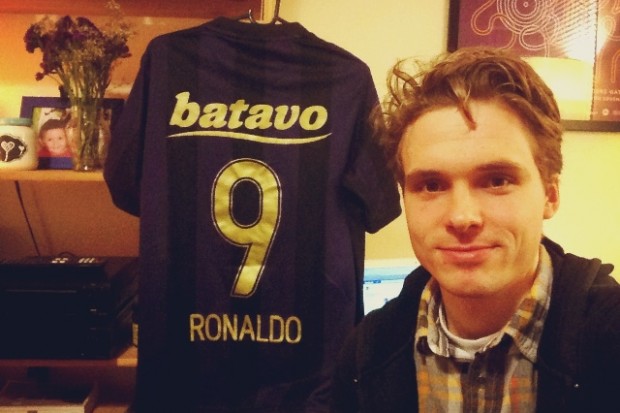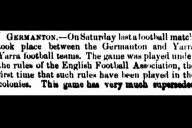It’s a big year for football and for Brazil, with the World Cup being held in the country that many view as the spiritual home of football. Of course, plenty of Socceroos fans will be making the pilgrimage to the land of Pelé, Christ the Redeemer and the Girl from Ipanema.
One of the best sources of information about Brazil’s vast and sometimes labyrinthine football scene is Jack Lang’s Snap, Kaká, and Pop! blog.
Lang’s reportage on the chaotic Brazilian scene not only brings you up to date with what’s going on in terms of basics like results, players and transfers, it also gives outsiders a context for understanding what’s happening in Brazilian football.
Lang is also the creator of the equally excellent Games Against Nature tumblr blog, which takes Brazilian football to a whole new level of poetic artistry.
Shoot Farken had a little chat to Lang via email and he gave us some insight into how he got into Brazilian football, as well as some valuable tips for those lucky enough to be travelling to Brazil for the World Cup.
SF: In your very first post for Snap, Kaká, and Pop! you mention that part of what prompted you to start the blog was that you had started a relationship with a Brazilian girl while you were studying in France. What did you know about Brazil and Brazilian football before that? Are you still with that girl?
JL: I am! We’ve been together seven years or so and are actually getting married soon. Before that, my knowledge of Brazil was pretty sketchy. And by sketchy, I of course mean stereotype-heavy. Sandy beaches, Carnaval, City of God and so on. A good time gal of a country.
That vision, I’ve since found, holds true in some respects (stereotypes develop for a reason, after all) but doesn’t come close to telling the whole story. As a football fan, I obviously knew the broad strokes – Garrincha, Pelé, 1982, Ronaldo Fenômeno’s heartbreak and redemption – but I knew very little about the domestic game aside from the odd team name (I had seen Vasco da Gama play Manchester United on television, so I definitely had that one in the locker).
So I suppose it’s fitting I’m still with the girl who piqued my interest in the country and therefore its football landscape.
How have you been received by Brazilians as an outside observer of their football scene? Are they surprised that you take such an interest in their domestic game considering we often hear them bemoaning the state of the game at home?
Well I certainly can’t pretend I’m at all well known in Brazil, but my Twitter followers and (real-life) Brazilian friends seem to think it has some novelty value. Gringos, of course, usually lap up anything to do with the Seleção, but there aren’t too many who take an interest in the club scene. (Or at least there never used to be; the internet has of course made it more accessible and there seems to be a growing following. It’s a bit of a cult league, especially for Europeans, who have to make do with the fuzziest of late-night streams.)
So when I first started getting into it, I’d have very lop-sided conversations with mates from Rio, who would (rightly) assume limited background knowledge on my part. But if you keep at something long enough, you eventually convince people you’re serious about it. There’s certainly plenty to write about.
You’ve had the opportunity to watch the rise of Neymar from precocious genius-in-the-making at Santos to a player who is starting to really hit his strides at the highest level of European football. So is he as overrated as some people think or indeed the greatest thing since Messi? What are your thoughts on him?
I think he is fantastic. Even when he started playing for the Santos first team, at 16 or 17, you could tell he was special. He was half the size of some of the defenders around him, but played with no fear, dribbling and trying his tricks. With age has come a bit more maturity and he’s already starting to look the part for Barcelona.
I can understand the scepticism to some extent – I’m as wary as any that YouTube compilations are no way to judge a player – but his talent was always plain to see, in my view. He was never just a show pony; his goal record in Brazil was phenomenal, and he always took responsibility even from a young age. I don’t know if he will quite get to the same level as Messi (no criticism, that) but he’s destined to be spoken about in the same breath in the coming years.
How hard was it to get your head around the whole Brazilian football experience, the fans, the clubs, the history? Do you spend a lot of time there? How do you keep up with it all?
I suppose I’m a little bit of a charlatan, in that I’ve yet to actually live there for an extended period. Since meeting my fiancée I’ve been on five occasions, often for two or three months at a time, but I would never profess to know the country as well as someone who lives there full-time.
There are some great Anglophone journalists doing good reportage (check out James Young, Andrew Downie, Dom Phillips), who have a far better grasp of the country than I do. For my part, I try to tell interesting stories as well as I can from the UK within those limitations.
Speaking Portuguese helps a lot, making it so much easier to gather information, get quotes and so on. I read a lot of opinion pieces, subscribe to a couple of magazines, and of course watch games and highlights (which are mercifully posted on the web by Globo). And when I am in Brazil, I attend games, chat about the game with friends and my fiancée’s relatives, soaking up as much as I can. The same stuff as any fan would do, really.
Oh, and for those who want a primer in Brazilian football, I thoroughly recommend Alex Bellos’ book Futebol, which does a great job outlining some of the defining traits of the game there.
Aside from football, what else is it that you love about Brazil?
The human warmth of the place is hard to beat. People greet you for the first time as if you’re an old friend, slapping you heartily on the back or kissing you on the cheeks. People actively – if subconsciously – knock down barriers to intimacy straight off the bat. It can take you by surprise a little at first, but once you’ve experience it, you realise how stuffy and needlessly formal people can be elsewhere by comparison.
Brazil’s natural landscape is also staggeringly beautiful; from mountains nosediving into the sea to wetlands and the jungle, it’s a place begging to be explored.
I’m also a fan of Brazilian music, although my range is still probably quite narrow. I like the softly-spoken wordsmiths of bossa nova – Vinícius de Moraes, Chico Buarque – as well as the more primitive psychedelia of the Tropicália movement and the unhinged experimentalism of guys like Tom Zé. Even some of the more poppy MPB (Música Popular Brasileira) stuff is interesting – although I’m acutely aware that it being in a foreign language lends it a mysticism that might be missing to Brazilian listeners.
Finally, can you give our readers who might be travelling to Brazil for the World Cup a few tips on what they should expect? What are Jack Lang’s essential tips for surviving and thriving in Brazil?
Surviving: Don’t be afraid to ask people questions. Anything. Directions, restaurant tips, what team they support. People are really forthcoming, and you’ll probably have a much more memorable time if you engage with locals rather than stick to the guidebook and Google. Plus, with stuff like public transport, you’ll probably need to ask for help, so you may as well get used to it!
Thriving: Go to the beach and people watch. You will never have more to look at than when perched on a towel or a deckchair on a busy day. Muscle-bound joggers, volleyball players, stoners, hawkers, tourists – they’re all there. It’s Brazil’s most democratic public good. And it’s free.
Thriving II: If you must go on a favela tour, be respectful. Those are people’s houses and lives, not a film set made for you to Instagram.
















